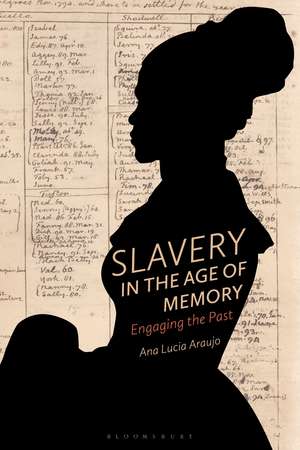Slavery in the Age of Memory: Engaging the Past
Autor Professor Ana Lucia Araujoen Limba Engleză Hardback – 14 oct 2020
| Toate formatele și edițiile | Preț | Express |
|---|---|---|
| Paperback (1) | 154.50 lei 3-5 săpt. | +49.59 lei 6-12 zile |
| Bloomsbury Publishing – 14 oct 2020 | 154.50 lei 3-5 săpt. | +49.59 lei 6-12 zile |
| Hardback (1) | 468.41 lei 6-8 săpt. | |
| Bloomsbury Publishing – 14 oct 2020 | 468.41 lei 6-8 săpt. |
Preț: 468.41 lei
Preț vechi: 576.18 lei
-19% Nou
Puncte Express: 703
Preț estimativ în valută:
89.63€ • 95.85$ • 74.73£
89.63€ • 95.85$ • 74.73£
Carte tipărită la comandă
Livrare economică 18 aprilie-02 mai
Preluare comenzi: 021 569.72.76
Specificații
ISBN-13: 9781350048485
ISBN-10: 1350048488
Pagini: 272
Ilustrații: 15 bw illus
Dimensiuni: 156 x 234 x 21 mm
Greutate: 0.54 kg
Editura: Bloomsbury Publishing
Colecția Bloomsbury Academic
Locul publicării:London, United Kingdom
ISBN-10: 1350048488
Pagini: 272
Ilustrații: 15 bw illus
Dimensiuni: 156 x 234 x 21 mm
Greutate: 0.54 kg
Editura: Bloomsbury Publishing
Colecția Bloomsbury Academic
Locul publicării:London, United Kingdom
Caracteristici
Helps readers to understand how the way in which slavery is remembered and memorialized by individuals, social groups and societies has changed over time
Notă biografică
Ana Lucia Araujo is Professor of History at Howard University, USA. She is the author of Public Memory of Slavery: Victims and Perpetrators in the South Atlantic World (2010), Shadows of the Slave Past: Memory, Heritage and Slavery (2014), Brazil through French Eyes: A Nineteenth-Century Artist in Brazil (2015) and Reparations for Slavery and the Slave Trade: A Transnational and Comparative History (Bloomsbury, 2017).
Cuprins
List of FiguresAcknowledgementsIntroduction: Slavery and Memory 1. Weaving Collective Memory 2. Shrines of Cultural Memory3. Battles of Public Memory 4. Setting Slavery in the Museum5. Memory and Public History6. Art of Memory Conclusion: The Persistence of the Past Notes Bibliography Index
Recenzii
[A] sharp analysis not just of how slavery is remembered, but of the ways it is erased.
[A] far-flung history whose strength is the breadth of individual, generational, intellectual, public, and activist efforts at commemorations, memorials and museums across a wide geographic range . Slavery in the Age of Memory is a whirlwind tour packed into a brief, readable narrative.
The book is an important contribution to the analysis of Atlantic slave trade memory and its continued implications in current social contexts, especially regarding historic public spaces and memory institutions ... By engaging the past as a way to dissolve hegemonic memory, the book adds force to the urgent recognition of Black public history and to international efforts to promote human rights and a more equitable collective memory.
The Atlantic system of slavery shaped the characters of all the countries that slavery touched. Richly researched, Slavery in the Age of Memory is a fascinating and necessary look at how former slave societies, from Brazil to Virginia, have tried to process the memory of slavery in the midst of lingering traumas wrought by the institution.
An important, comprehensive and insightful analysis of 'modalities of memory' of slavery, this book is multi-layered, versatile and compelling. Revealing herself once again as one of the foremost international experts in the field, Professor Araujo meets and surpasses her long-established reputation for rigorous investigation, critical depth and astute observations.
Drawing on a wide array of sources, Ana Lucia Araujo explores the ways that slavery and the Atlantic slave trade have been remembered and commemorated across the globe. From the Americas to Europe and Africa, Slavery in the Age of Memory demonstrates that people and institutions are still wrestling with slavery's past. This book is timely and necessary.
[A] far-flung history whose strength is the breadth of individual, generational, intellectual, public, and activist efforts at commemorations, memorials and museums across a wide geographic range . Slavery in the Age of Memory is a whirlwind tour packed into a brief, readable narrative.
The book is an important contribution to the analysis of Atlantic slave trade memory and its continued implications in current social contexts, especially regarding historic public spaces and memory institutions ... By engaging the past as a way to dissolve hegemonic memory, the book adds force to the urgent recognition of Black public history and to international efforts to promote human rights and a more equitable collective memory.
The Atlantic system of slavery shaped the characters of all the countries that slavery touched. Richly researched, Slavery in the Age of Memory is a fascinating and necessary look at how former slave societies, from Brazil to Virginia, have tried to process the memory of slavery in the midst of lingering traumas wrought by the institution.
An important, comprehensive and insightful analysis of 'modalities of memory' of slavery, this book is multi-layered, versatile and compelling. Revealing herself once again as one of the foremost international experts in the field, Professor Araujo meets and surpasses her long-established reputation for rigorous investigation, critical depth and astute observations.
Drawing on a wide array of sources, Ana Lucia Araujo explores the ways that slavery and the Atlantic slave trade have been remembered and commemorated across the globe. From the Americas to Europe and Africa, Slavery in the Age of Memory demonstrates that people and institutions are still wrestling with slavery's past. This book is timely and necessary.
